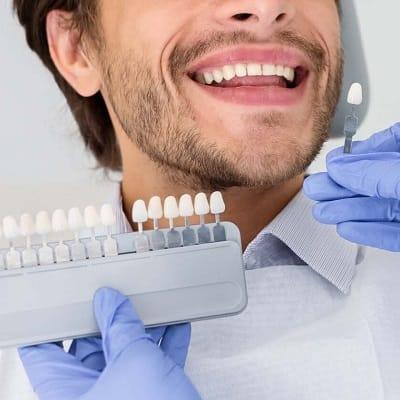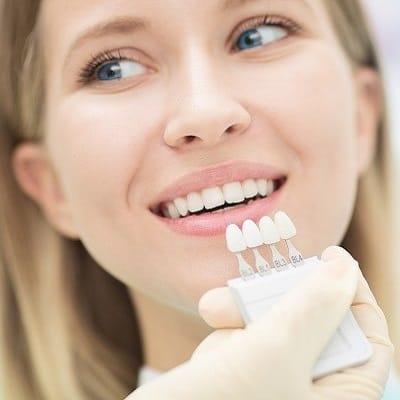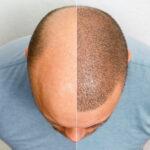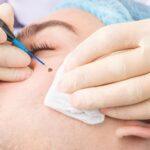
Proper dental care is a crucial determinant that helps enhance the veneers’ durability and esthetics. Veneering is thin strips of porcelain or hard resin bonded to the surface of the teeth to improve esthetics. They are in a position to remedy several dental issues such as staining, the existence of cracks, or misaligned teeth, thus adding beauty to the face through a smile.
However, like natural teeth, veneers require constant maintenance for several reasons, such as staining, decaying, or damage. In this guide, we learn about dental hygiene for veneers and understand whether brushing them and how to do it properly is possible.
What Are Veneers?
A veneer is a thin delicate layer of tooth-like material and structure to be put on the face of a tooth or teeth.
Porcelain veneers are thin layers of ceramic made from almost translucent porcelain in a dental laboratory. They are safer, rugged, and rough in texture. They give the country appeal, are hard to stain, and provide a closer-to-nature feel.
Conversely, composite veneers are bonded onto the surface of the teeth using plastic-based resin. Their potential wear, fade, and stains are shorter than those of porcelain veneers, and thus, they are comparatively cheaper.
Benefits of Veneers:
Some benefits include improving teeth’ beauty or aesthetics; veneers can also cover damaged teeth.
One significant advantage related to veneers is beautifying the teeth. They can effectively alter dental imperfections such as stains, breaks, cracks, or gaps between teeth, providing a better and symmetrical look. Dental veneers are made to fit the natural shade and size of the Government’s teeth to make them as natural as possible.
Moreover, veneers act as coverings for the previously damaged teeth to indicate paving a solid barrier over the tooth. This can help avoid additional harm or caries, especially if the tooth has already suffered specific micro-cracks or enamel loss.
Besides concealing the tooth’s front surface, the veneer puts a protective cover around it to increase its durability, thus enhancing the functionality and beauty of the smile.
How Veneers Are Applied?
- First, the dentist will examine the teeth to establish if veneers will appropriately solve the problem. If so, they will review the likely goals and expectations from the procedure with the patient.
- Then, the dentist prepares the teeth for the application by reducing a thin layer of the front side’s enamel. This creates space and ensures that the veneers will fit directly into the designed structure.
- Subsequently, the dentist will take an impression or a digital scan of the prepared teeth to form veneers in a dental laboratory.
- At the next visit the veneers are placed on the teeth to check the proper fit as well as positions and shade.
- Your dentist will adjust it if needed and then set it in place permanently using special cement.
Why Should You Brush Veneers?
As with any other oral procedure, brushing is helpful in preventing damage to teeth and preserving the condition of veneers. Brushing also reduces the formation of plague and tartar which cause color changes and enamel decay in veneers.
Due to the material used, veneers are prone to staining when proper hygiene is not followed closely. If veneers are not cleaned regularly, they can get chipped or stained, compromising the work’s essence. Lastly, it also increases the probability of developing gum problems, which reign in inflammation of the gums and gum bleeding and can result in toothless people if not well-tamed.
One should also brush veneers gently with non-gritty toothpaste in a soft-headed brush and remove plaque on the veneers and adjacent teeth by flossing it carefully.
Proper brushing techniques for veneers:
To brush veneers effectively, follow these steps:
- Twist off the water, and using the toothbrush, place only enough paste on the bristles to fill the center of the brush head, about the size of a pea.
- The primary step is to angle the toothbrush’s bristles towards the gum line at around 45 degrees.
- You should also clean the front and back sides of the veneers using a brush with small circular movements.
- Take particular care and focus on the juncture where the veneers end and the natural teeth begin.
- Sweep the surfaces of the teeth and tongue surfaces to eliminate germs and enrich breathing.
- After spitting, use water to rinse your mouth as much as possible.
Cost of Dental Veneers In Islamabad:
The veneer cost for each tooth in Islamabad ranges between PKR 30,000 and PKR 35,000. Dental services’ prices in Islamabad may depend on their type, the required cases, and the experience of the clinic or the specific dentist.
Book a consultation!
Enfield Royal Clinic is a dental clinic staffed with professional and talented dentists driven by a Patient-centered mission. Our clinic offers primary dental care, aesthetic dental care, orthodontic dental care, and other services, which makes it helpful in catering to patients’ various needs. Book a Consultation Today!







